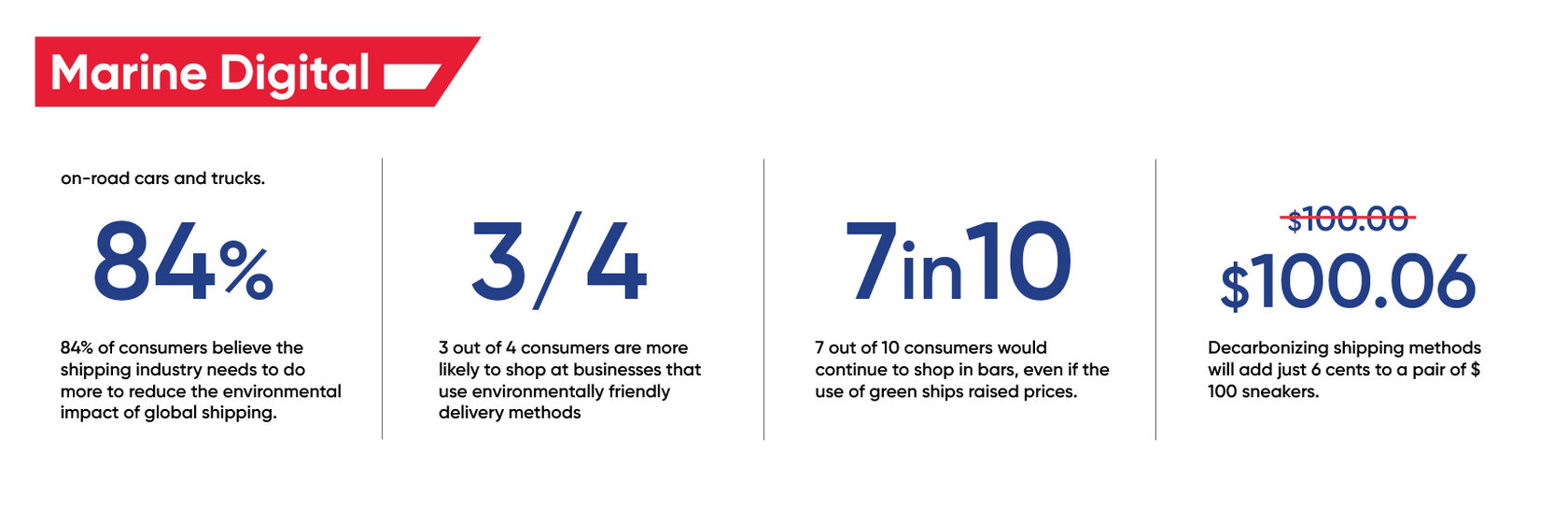Why do huge Retail companies need greener ships
Globally, the growth of shipping has a huge impact on the environment and public health. Each year, the shipping industry emits one billion metric tons of air emissions, causes 6.4 million cases of childhood asthma, and causes 260,000 premature deaths
The retail giants have outsourced consumer goods manufacturing for decades. This has led to a significant increase in fossil fuel shipping. The world's shipping fleet has quadrupled since the 1980s to keep up with demand. Globally, the growth of shipping has a huge impact on the environment and public health. Each year, the shipping industry emits one billion metric tons of air emissions, causes 6.4 million cases of childhood asthma and causes 260,000 premature deaths.
However, the data on the contribution of specific companies to these global figures is relatively unknown. We attempted to determine which retailers are responsible for the highest levels of fossil fuel pollution due to their annual marine imports.
Сontainer imports from America's 15 largest retail giants in 2019 caused the same climate pollution as three coal-fired power plants or the energy needed to power 1.5 million American homes. These retail giants have produced 7.3 times more carcinogenic sulfur oxide (SOx) emissions than all road vehicles in the United States combined, or 2 billion trucks and cars. They produced as much smog-generating NOx, a major air pollutant of concern in the ports of Los Angeles and Long Beach due to their Clean Air Act legal requirements, as 27.4 million cars and trucks. And they produced as many emissions of particulate matter 2.5 (PM2.5) and nitrous oxide (NOx), pollutants directly associated with asthma, lung failure, heart disease, and cancer, as the entire mining industry in the United States.
The 15 Retailers with the Largest US Marine Import Emissions and Pollution Levels in 2019:

These 15 retailers added 12.7 million metric tons of carbon dioxide (CO2) emissions to the atmosphere through sea-borne imports to the United States in 2019. That's the equivalent of three coal-fired power plants or the energy needed to power 1.5 million American homes. Importing Walmart containers into the United States alone produced 3.7 million metric tons of carbon dioxide, the same as the entire coal-fired power plant operating in the United States for a year. The US import of Target containers alone produced 2.2 million metric tons of CO2 - more than the total CO2 emissions of the world's 20 smallest countries most vulnerable to climate change.

Every product transported by ship in 2019 by these 15 companies was transported by a fossil-fueled ship. Retailers can immediately reduce shipping emissions by simply ensuring that their current contracts with shippers require their products to be transported on the company's greenest ships.
After matching the cargo manifests with a dataset showing emissions from individual ships, the researchers behind the analysis concluded that 15 large US companies, including Ikea, Target, Walmart, Amazon, Home Depot, Nike, and Samsung, produced approximately 12.7 million metric tons of carbon. carbon dioxide from their shipping in 2019, roughly equivalent to the annual emissions of three coal-fired power plants. The report estimated that Walmart alone was responsible for 3.7 million metric tons of carbon pollution that year due to its shipping, more than the annual output of the entire coal-fired power plant. Collectively, the study shows that 15 companies are responsible for more sulfur emissions than all road vehicles in the US combined, and as much particulate matter and nitrous oxide emissions as the entire US mining industry.
In response to the findings, a Target spokesman stressed that the company is committed to reducing its transportation carbon footprint as part of its efforts to achieve net zero emissions by 2040.
A spokesperson for Ikea said the company acknowledged that it is responsible for "positively impacting the climate agenda in the maritime transport industry" as a major user of maritime shipping, and indicated a commitment to reduce its shipping's carbon footprint by about 70 percent. by the end of the decade. Shipping accounts for 40 percent of the climate impact associated with transporting the company's products from suppliers to warehouses and stores, according to the company.
Read more: Big Data in Maritime: How a shipping company can effectively use data
After matching the cargo manifests with a dataset showing emissions from individual ships, the researchers behind the analysis concluded that 15 large US companies, including Ikea, Target, Walmart, Amazon, Home Depot, Nike, and Samsung, produced approximately 12.7 million metric tons of carbon. carbon dioxide from their shipping in 2019, roughly equivalent to the annual emissions of three coal-fired power plants. The report estimated that Walmart alone was responsible for 3.7 million metric tons of carbon pollution that year due to its shipping, more than the annual output of the entire coal-fired power plant. Collectively, the study shows that 15 companies are responsible for more sulfur emissions than all road vehicles in the US combined, and as much particulate matter and nitrous oxide emissions as the entire US mining industry.
In response to the findings, a Target spokesman stressed that the company is committed to reducing its transportation carbon footprint as part of its efforts to achieve net zero emissions by 2040.
A spokesperson for Ikea said the company acknowledged that it is responsible for "positively impacting the climate agenda in the maritime transport industry" as a major user of maritime shipping, and indicated a commitment to reduce its shipping's carbon footprint by about 70 percent. by the end of the decade. Shipping accounts for 40 percent of the climate impact associated with transporting the company's products from suppliers to warehouses and stores, according to the company.
Read more: Big Data in Maritime: How a shipping company can effectively use data
American consumers are eager and ready to support cleaner shipping. In an October 2020 poll by Yale University, George Mason University, and Climate Nexus, a large majority of American shoppers (74%) responded that they would change where they shop to maintain a cleaner supply of goods. The poll also showed that almost all of these buyers (70%) would continue to patronize the company if the price of goods rose marginally due to cleaner shipping decisions. Three-quarters (75%) of Americans surveyed are more supportive of a company that imports its products using the cleanest fuel available, and 73% are more positive of a company that was the first to ship its products on a zero-emission ship. Finally, 72% were favorable for the company, which reduced its shipping-related emissions by just a third of their current emissions. More than eight in 10 respondents (84%) agree that the shipping industry needs to do more to reduce the climate impact of global shipping. Seven in ten (70%) would prefer to shop at a leading clean company, even if the use of clean ships has increased the prices of goods. Luckily for consumers, zero-emission shipping doesn't hurt their wallet. Maersk, the world's largest shipping company, reckons decarbonized shipping will likely add just 6 cents to a pair of $ 100 sneakers.
Consumer needs

In January 2021, the United Nations Climate Change Organization announced a breakthrough target for the shipping industry to achieve 5% zero-emission fuel by 2030. Only 8 major shipping routes emit 7 million tonnes of CO2 every year. These 8 routes alone can account for almost 1% of the total 5% of the zero-emission fuel needed. Only the companies identified in this report have the market power to single-handedly bring about this change, initiating the achievement of this pioneering goal. These routes are:
- Bosphorus Strait
- Panama Canal
- Saint Lawrence Seaway
- Strait of Hormuz
- Strait of Malacca
- Suez Canal
- The Danish Straits
- The English Channel

According to the latest data from the European Commission, Germany's CO2 and greenhouse gas emissions account for about 2.2% and 1.9% of total global emissions, respectively - about the same as international shipping.
Comparing countries by country can also be used as a tool to demonstrate the extent of pollution in the shipping industry.
International Council for Clean Transport (ICCT), an independent environmental research organization, said that viewed as a country, international shipping will be the sixth largest emitter of CO2, same as Germany. Top countries are China, USA, India, Russia and Japan
They pointed to a list of countries with the highest levels of pollution compiled by the Netherlands Environmental Assessment Agency PBL, which is part of the Dutch Ministry of Infrastructure. Public works and water management, making international shipping the sixth largest CO2 emitter.
Comparing countries by country can also be used as a tool to demonstrate the extent of pollution in the shipping industry.
International Council for Clean Transport (ICCT), an independent environmental research organization, said that viewed as a country, international shipping will be the sixth largest emitter of CO2, same as Germany. Top countries are China, USA, India, Russia and Japan
They pointed to a list of countries with the highest levels of pollution compiled by the Netherlands Environmental Assessment Agency PBL, which is part of the Dutch Ministry of Infrastructure. Public works and water management, making international shipping the sixth largest CO2 emitter.
If shipping were a country

The retail giants are polluting communities and the climate with their fossil-fueled shipping on a massive scale. If retailers continue to rely on fossil fuel shipping to import their products, they must take responsibility for the pollution they generate during the voyage.
Without including maritime emissions in their corporate responsibility or climate reports, these retailers are not honoring the spirit of their climate commitments or their debt to the customers they serve.
Companies alone will not achieve 100% zero-emission shipping. Ambitious, mandatory regulations that force new technologies and create new markets are essential.
Read more about: Greentech in shipping Industry
Without including maritime emissions in their corporate responsibility or climate reports, these retailers are not honoring the spirit of their climate commitments or their debt to the customers they serve.
Companies alone will not achieve 100% zero-emission shipping. Ambitious, mandatory regulations that force new technologies and create new markets are essential.
Read more about: Greentech in shipping Industry
Conclusion
Retail companies have unique responsibilities to their customers. We are calling on major retailers to:
Actions Retail Giants Must Take
Give up dirty ships
Stop transporting products on fossil-fueled ships, reject false decisions like LNG, and immediately demand from ships that incorporate existing technologies and techniques to reduce emissions, including wind engines, slow streams and fuel-optimized routes
Set Sail First
Sign contracts now to ship your goods on ships with zero emissions and accelerate investment, development and production of such technologies.
Put Zero at the Helm
Strive for zero emissions and create a company strategy to achieve this goal.
Companies alone will not achieve 100% zero-emission shipping. Ambitious, mandatory regulations that force new technologies and create new markets are essential. We call on U.S. policymakers to:
Actions Policy Makers Must Take
Set the standard for a clean ship
On April 20, 2021, the US pledged to lead the shipping industry with absolute zero emissions until 2050. This is a good start. The US should now demand reductions in air and climate emissions for all ships docked in US ports, respectively. This is a good example of a green ship standard.
Increased transparency of maritime imports / exports of emissions
The government should establish an internal monitoring, reporting and verification system and require companies to disclose in cargo declarations customs declarations for all their shipments in cargo manifests and bills of lading.
Make polluters pay
Introduce charges for air and climate pollution on ships to accelerate revenue generation from low- and zero-emission shipping technologies.
In contrast to technologies that require expensive equipment replacement or even building the new ships with modern technologies and equipment, the fuel optimization system by Marine Digital collects data from the ship's sensors, satellites and built-in trackers, processes the information using machine learning algorithms and provides recommendations on the optimal route in terms of economy. Marine Digital FOS to reduce fuel consumption collects data on 5 main categories out of 40 parameters, each factor category affects fuel consumption from 3 to 7%, and the combined effect reaches up to 12% saving fuel and the reduction of emissions.
Moreover, the system provides statistical and analytical reports for management decisions, such as when to clean and repaint the case, when to carry out prevention and warranty maintenance, in order to prevent miscellany and equipment breakdowns on the ship.
Source: Shady Ships report by shipitzero.org
Moreover, the system provides statistical and analytical reports for management decisions, such as when to clean and repaint the case, when to carry out prevention and warranty maintenance, in order to prevent miscellany and equipment breakdowns on the ship.
Source: Shady Ships report by shipitzero.org

TOP 5 factors contributing to lower fuel costs for Shipping companies
Get a presentation with a full description of the features and free pilot project with trial of Marine Digital FOS for 2 months
"Clicking the button, you consent to the processing of personal data and agree to the privacy policy"

Get an overview "The Pathway to Zero Carbon Shipping:
IMO Compliance and CII Optimization through SEEMP" on email and download it for FREE! Leave your email now!
"Clicking the button, you consent to the processing of personal data and agree to the privacy policy, as well as consent to subscribe to the newsletter. "
Аdvantage of Fuel Optimization System from Marine Digital:

Marine Digital FOS can be integrated with other system and third-party's solutions through the API. To implement vessel performance monitoring for any vessel, we are using mathematical algorithms, machine learning and the same equipment as in FOS. The more data we collect from vessels, the more precise reports and recommendations our system will perform according to your individual requirements in fleet management.
If you have any questions about the solutions and the Marine Digital System platform, write to us, we will be happy to answer
If you have any questions about the solutions and the Marine Digital System platform, write to us, we will be happy to answer

Increased business process speed

Reducing to zero the number of errors

Best offer to the clients

Reduction in operating expenses
Have a questions?





